Related Research Articles

Organic farming, also known as ecological farming or biological farming, is an agricultural system that uses fertilizers of organic origin such as compost manure, green manure, and bone meal and places emphasis on techniques such as crop rotation and companion planting. It originated early in the 20th century in reaction to rapidly changing farming practices. Certified organic agriculture accounts for 70 million hectares globally, with over half of that total in Australia. Biological pest control, mixed cropping, and the fostering of insect predators are encouraged. Organic standards are designed to allow the use of naturally-occurring substances while prohibiting or strictly limiting synthetic substances. For instance, naturally-occurring pesticides such as pyrethrin are permitted, while synthetic fertilizers and pesticides are generally prohibited. Synthetic substances that are allowed include, for example, copper sulfate, elemental sulfur, and veterinary drugs. Genetically modified organisms, nanomaterials, human sewage sludge, plant growth regulators, hormones, and antibiotic use in livestock husbandry are prohibited. Organic farming advocates claim advantages in sustainability, openness, self-sufficiency, autonomy and independence, health, food security, and food safety.
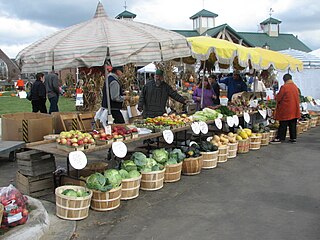
A farmers' market is a physical retail marketplace intended to sell foods directly by farmers to consumers. Farmers' markets may be indoors or outdoors and typically consist of booths, tables or stands where farmers sell their produce, live animals and plants, and sometimes prepared foods and beverages. Farmers' markets exist in many countries worldwide and reflect the local culture and economy. The size of the market may be just a few stalls or it may be as large as several city blocks. Due to their nature, they tend to be less rigidly regulated than retail produce shops.

Organic certification is a certification process for producers of organic food and other organic agricultural products. In general, any business directly involved in food production can be certified, including seed suppliers, farmers, food processors, retailers and restaurants. A lesser known counterpart is certification for organic textiles that includes certification of textile products made from organically grown fibres.

The National Organic Program (NOP) is the federal regulatory framework in the United States of America governing organic food. It is also the name of the United States Department of Agriculture (USDA) Agricultural Marketing Service (AMS) program responsible for administering and enforcing the regulatory framework. The core mission of the NOP is to protect the integrity of the USDA organic seal. The seal is used for products adhering to USDA standards that contain at least 95% organic ingredients.

The Organic Crop Improvement Association (OCIA) is a member-owned, non-profit organization, which provides research, education and certification services to organic growers, processors and handlers around the world. OCIA certifies and verifies farm, livestock, processor/handlers, broker-traders, Community Grower Groups (CGGs), and Private Labels to various programs.

The Federal Insecticide, Fungicide, and Rodenticide Act (FIFRA) is a United States federal law that set up the basic U.S. system of pesticide regulation to protect applicators, consumers, and the environment. It is administered and regulated by the United States Environmental Protection Agency (EPA) and the appropriate environmental agencies of the respective states. FIFRA has undergone several important amendments since its inception. A significant revision in 1972 by the Federal Environmental Pesticide Control Act (FEPCA) and several others have expanded EPA's present authority to oversee the sales and use of pesticides with emphasis on the preservation of human health and protection of the environment by "(1) strengthening the registration process by shifting the burden of proof to the chemical manufacturer, (2) enforcing compliance against banned and unregistered products, and (3) promulgating the regulatory framework missing from the original law".
The Agricultural Marketing Service (AMS) is an agency of the United States Department of Agriculture; it maintains programs in five commodity areas: cotton and tobacco; dairy; fruit and vegetable; livestock and seed; and poultry. These programs provide testing, standardization, grading and market news services for those commodities, and oversee marketing agreements and orders, administer research and promotion programs, and purchase commodities for federal food programs. The AMS enforces certain federal laws such as the Perishable Agricultural Commodities Act and the Federal Seed Act. The AMS budget is $1.2 billion. It is headquartered in the Jamie L. Whitten Building in Washington, D.C.
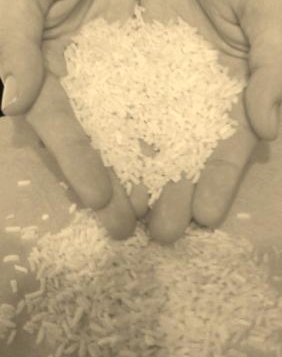
Food policy is the area of public policy concerning how food is produced, processed, distributed, purchased, or provided. Food policies are designed to influence the operation of the food and agriculture system balanced with ensuring human health needs. This often includes decision-making around production and processing techniques, marketing, availability, utilization, and consumption of food, in the interest of meeting or furthering social objectives. Food policy can be promulgated on any level, from local to global, and by a government agency, business, or organization. Food policymakers engage in activities such as regulation of food-related industries, establishing eligibility standards for food assistance programs for the poor, ensuring safety of the food supply, food labeling, and even the qualifications of a product to be considered organic.

Food safety is used as a scientific method/discipline describing handling, preparation, and storage of food in ways that prevent foodborne illness. The occurrence of two or more cases of a similar illness resulting from the ingestion of a common food is known as a food-borne disease outbreak. This includes a number of routines that should be followed to avoid potential health hazards. In this way, food safety often overlaps with food defense to prevent harm to consumers. The tracks within this line of thought are safety between industry and the market and then between the market and the consumer. In considering industry-to-market practices, food safety considerations include the origins of food including the practices relating to food labeling, food hygiene, food additives and pesticide residues, as well as policies on biotechnology and food and guidelines for the management of governmental import and export inspection and certification systems for foods. In considering market-to-consumer practices, the usual thought is that food ought to be safe in the market and the concern is safe delivery and preparation of the food for the consumer. Food safety, nutrition and food security are closely related. Unhealthy food creates a cycle of disease and malnutrition that affects infants and adults as well.

Organic egg production is the production of eggs through organic means. In this process, the poultry are fed organic feed. According to the United States Department of Agriculture, organic means that the laying hens must have access to the outdoors and cannot be raised in cages. Only natural molting can occur within the flock; forced molting is not allowed. Organic certification also requires maintenance of basic animal welfare standards.

Organic farming is practiced around the globe, but the markets for sale are strongest in North America and Europe, while the greatest dedicated area is accounted for by Australia, the greatest number of producers are in India, and the Falkland Islands record the highest share of agricultural land dedicated to organic production.

Organic food, ecological food, or biological food are foods and drinks produced by methods complying with the standards of organic farming. Standards vary worldwide, but organic farming features practices that cycle resources, promote ecological balance, and conserve biodiversity. Organizations regulating organic products may restrict the use of certain pesticides and fertilizers in the farming methods used to produce such products. Organic foods are typically not processed using irradiation, industrial solvents, or synthetic food additives.
The Organic Foods Production Act of 1990 (OFPA) authorizes a National Organic Program (NOP) to be administered by USDA's Agricultural Marketing Service (AMS). The program is based on federal regulations that define standard organic farming practices and on a National List of acceptable organic production inputs. Private and state certifiers visit producers, processors, and handlers to certify that their operations abide by the standards. Once certified, these operations may affix the USDA Organic Seal. USDA has established four distinct categories for labeling organic products—100 percent organic, organic, "made with" organic ingredients, and specific organic ingredients—and only 100 percent organic and organic categories can use the USDA Organic Seal. It is illegal for anyone to use the word "organic" on a product if it does not meet the standards set in the law and regulations. The regulations under the OFPA are intended to set uniform minimum standards for organic production. However, states may adopt additional requirements after review and approval by USDA. AMS re-accredits certifying agents every 5 years, maintains federal oversight to assure truth in labeling, and provides assurance that imported organic products have been produced under standards that are equivalent to the U.S. standards.
Organic aquaculture is a holistic method for farming fish and other marine species in line with organic principles. The ideals of this practice established sustainable marine environments with consideration for naturally occurring ecosystems, use of pesticides, and the treatment of aquatic life. Managing aquaculture organically has become more popular since consumers are concerned about the harmful impacts of aquaculture on themselves and the environment.
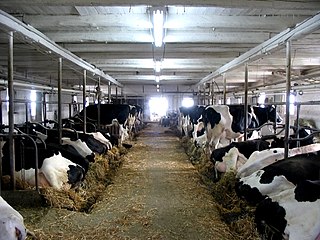
Dairy farming is one of the largest agricultural sectors in Canada. Dairy has a significant presence in all of the provinces and is one of the top two agricultural commodities in seven out of ten provinces.

The Food Safety Modernization Act (FSMA) was signed into law by President Barack Obama on January 4, 2011. The FSMA has given the Food and Drug Administration (FDA) new authority to regulate the way foods are grown, harvested and processed. The law grants the FDA a number of new powers, including mandatory recall authority, which the agency had sought for many years. The FSMA requires the FDA to undertake more than a dozen rulemakings and issue at least 10 guidance documents, as well as a host of reports, plans, strategies, standards, notices, and other tasks.

The Food Safety and Inspection Service (FSIS), an agency of the United States Department of Agriculture (USDA), is the public health regulatory agency responsible for ensuring that United States' commercial supply of meat, poultry, and egg products is safe, wholesome, and correctly labeled and packaged. The FSIS draws its authority from the Federal Meat Inspection Act of 1906, the Poultry Products Inspection Act of 1957 and the Egg Products Inspection Act of 1970. The FSIS also acts as a national health department and is responsible for the safety of public food-related establishments as well as business investigation.
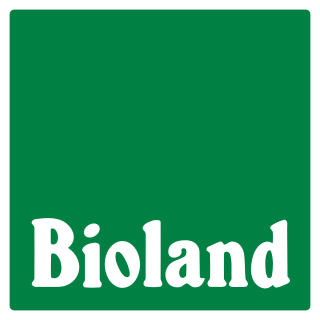
Bioland is the largest organic-food association in Germany. Its organic certification standards exceed EU minimum requirements.
The trade policy of Switzerland refers to Switzerland's approach to importing and exporting with other countries.
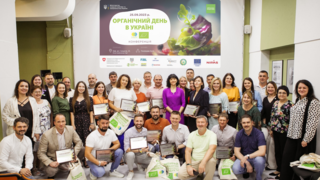
Organic market in Ukraine is a segment of the economy aimed at the production, circulation and consumption of organic products. The organic market in Ukraine includes the cultivation, production and/or circulation of various agri-food products in accordance with the organic production standards established by Ukrainian and/or international legislation. This market is an important segment of the Ukrainian agriculture and consumer market, which contributes to the preservation of the environment, maintenance of soil, plant, animal and human health, and development of sustainable agriculture.
References
- ↑ "Who is Bio Suisse".
- ↑ "Facts and figures". www.bio-suisse.ch.
- ↑ "Facts and figures". www.bio-suisse.ch. Retrieved 2019-10-02.
- ↑ "The Bud Label stands for". www.bio-suisse.ch. Retrieved 2019-10-02.
- ↑ "Downloads". www.bio-suisse.ch. Retrieved 2019-10-02.
- ↑ "Import policy of Bio Suisse". www.bio-suisse.ch. Retrieved 2019-10-02.
- ↑ "Requirements for import". www.bio-suisse.ch. Retrieved 2019-10-02.